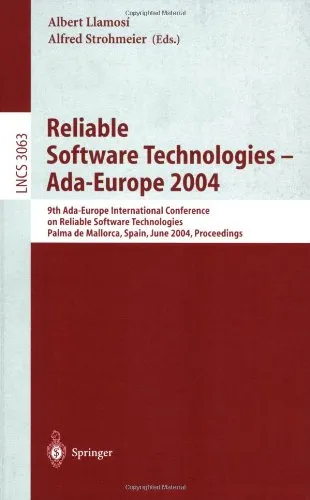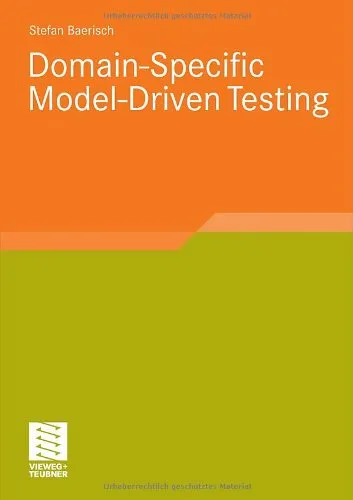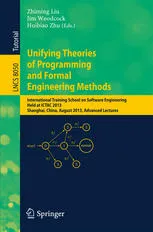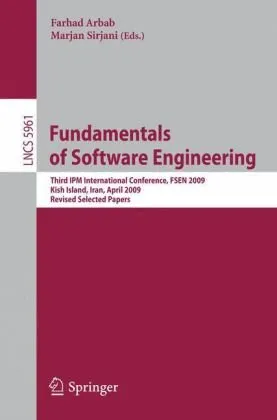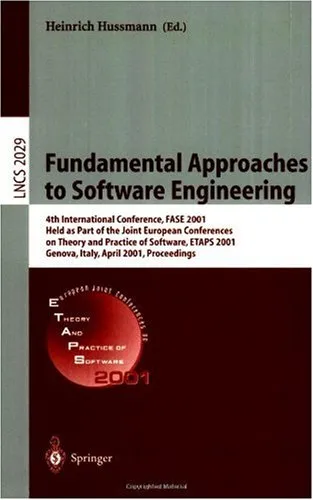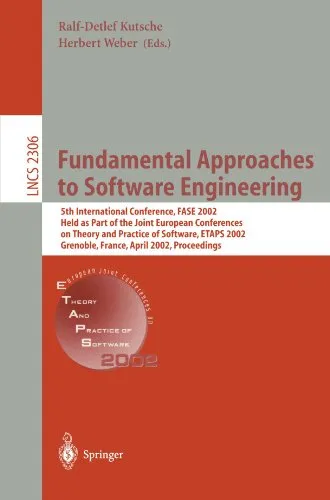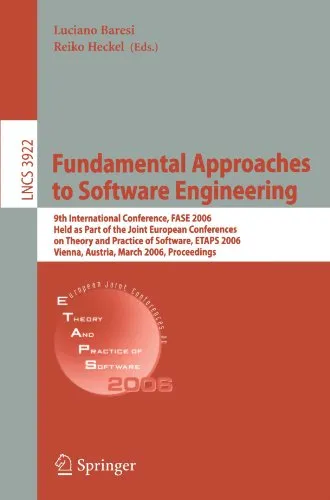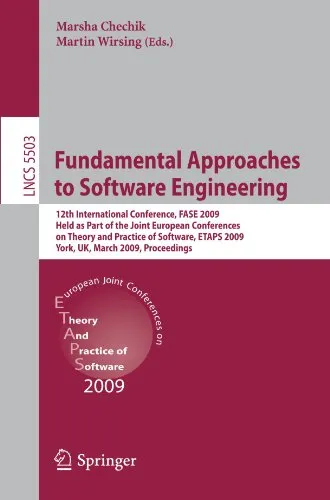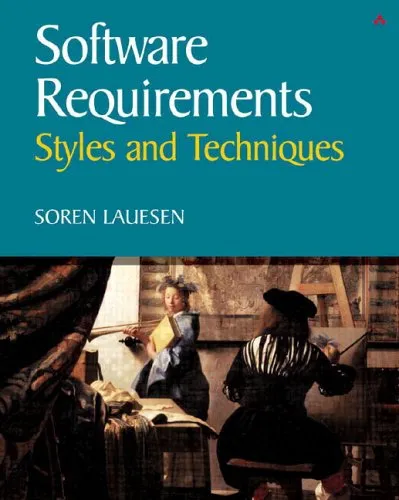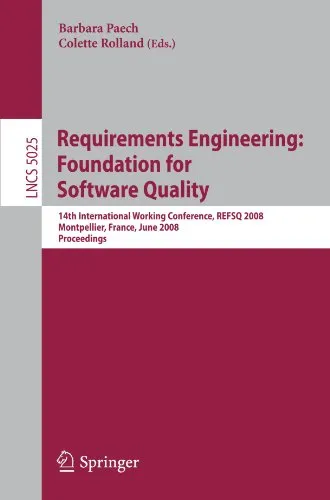Requirements Engineering: Foundation for Software Quality: 13th International Working Conference, REFSQ 2007, Trondheim, Norway, June 11-12, 2007. Proceedings
4.0
بر اساس نظر کاربران

شما میتونید سوالاتتون در باره کتاب رو از هوش مصنوعیش بعد از ورود بپرسید
هر دانلود یا پرسش از هوش مصنوعی 2 امتیاز لازم دارد، برای بدست آوردن امتیاز رایگان، به صفحه ی راهنمای امتیازات سر بزنید و یک سری کار ارزشمند انجام بدینکتاب های مرتبط:
معرفی کتاب
کتاب «Requirements Engineering: Foundation for Software Quality: 13th International Working Conference, REFSQ 2007, Trondheim, Norway, June 11-12, 2007. Proceedings»، مجموعه مقالات ارائه شده در سیزدهمین کنفرانس بینالمللی REFSQ را شامل میشود. این کنفرانس به مهندسی نیازمندیها و تأثیر آن بر کیفیت نرمافزار اختصاص دارد. این اثر نقش مهمی در تعمیق دانش پژوهشگران و متخصصان در زمینه مهندسی نیازمندیها ایفا میکند و بر ارتباط میان مفاهیم تئوری و کاربردهای عملی تمرکز دارد.
خلاصهای از کتاب
این کتاب حاوی مقالاتی است که جدیدترین پژوهشها، ایدهها و بهبودهای روششناسی در زمینه Requirements Engineering را معرفی میکنند. موضوعات مطرح شده در این اثر شامل فعالیتهای شناسایی و تحلیل نیازمندیها، روشهای مدلسازی نیازمندیها، تضمین کیفیت نیازمندیها، و کاربردهای عملی مفاهیم در صنایع نرمافزاری میباشد. کنفرانس REFSQ 2007 بستری برای تبادل اطلاعات میان پژوهشگران، متخصصان و توسعهدهندگان بوده است تا ضمن یادگیری از یکدیگر، به بهبود سیستمهای نرمافزاری کمک کنند.
نکات کلیدی
- بررسی دقیق مفهوم traceability و اهمیت آن در Requirements Engineering.
- ارتباط بین نیازمندیها و کیفیت نرمافزار، شامل روشهای تضمین کیفیت.
- معرفی ابزارهای مدرن برای مدلسازی و تحلیل نیازمندیها.
- بحث در مورد نقش ذینفعان (stakeholders) در فرایند جمعآوری نیازمندیها.
- مطالعه موردی کاربرد مهندسی نیازمندیها در پروژههای واقعی نرمافزاری.
جملات معروف از کتاب
“Requirements are not just about what a system should do, but also about what it must not do.”
“Traceability ensures that each requirement serves a purpose, connecting all dots from conception to implementation.”
چرا این کتاب مهم است؟
این کتاب بهعنوان مرجع معتبری برای دانشجویان، محققان و متخصصان حوزه نرمافزار نقش مهمی ایفا میکند. مقالههای گردآوریشده از جانب پژوهشگران برجسته در این کنفرانس، نشاندهنده ارتقای مداوم در روشها و ابزارهای مرتبط با Requirements Engineering است. علاوه بر این، این اثر پیوند میان دانش علمی و نیازهای صنعتی را تقویت کرده و به بهبود کیفیت نرمافزارها و فرایند تولید آنها کمک میکند.
اگر به دنبال درک عمیقتر از فعالیتهای مرتبط با مهندسی نیازمندیها و کاربردهای عملی آن هستید، این کتاب منبعی ارزنده برای شما خواهد بود. با توجه به مطالب نوین و مبتنی بر پژوهشهای علمی ارائه شده در این اثر، مطالعه آن به همه افراد فعال در این زمینه توصیه میشود.
Introduction
The book “Requirements Engineering: Foundation for Software Quality” provides an invaluable perspective into the field of requirements engineering (RE), examining how it underpins the success of software development projects. This volume is the culmination of the 13th International Working Conference REFSQ 2007, held in Trondheim, Norway, where leading researchers, industry experts, and practitioners convened to discuss innovations, challenges, and emerging trends in requirements engineering.
This book not only documents the advancements shared at the REFSQ 2007 conference but also expands on how RE is a cornerstone for building high-quality software systems. With topics ranging from elicitation techniques to quality measures, it serves as both an academic resource and a practical reference for engineers, developers, and project managers. The proceedings are thematically rich, reflecting diverse approaches to improving software quality, guiding readers on how to effectively transition from user requirements to functional, reliable software solutions.
Detailed Summary
The book is organized into peer-reviewed papers and discussions covering both theoretical and practical aspects of requirements engineering. REFSQ 2007 was not merely a platform for academic presentation but a collaborative effort to address key issues surrounding software quality through precise requirement specifications. The contents present groundbreaking research and real-world applications across various industries.
The proceedings start with insights into requirement elicitation and how it impacts the software lifecycle. Topics such as stakeholder communication, needs prioritization, and tools for requirement gathering are explored in-depth. The book emphasizes the importance of balancing user needs against technical and resource limitations, offering frameworks and methodologies to guide this critical process.
Subsequent sections delve into advancements in formal methods, model-driven engineering, and traceability practices, providing a blend of theory and actionable takeaways. The discussions highlight emerging trends such as the integration of agile practices into requirements engineering and the role of RE in addressing security, privacy, and ethical concerns in modern software systems.
Ultimately, the book aligns itself with the collective goal of the RE community: to improve the effectiveness of requirements engineering and, by extension, the overall quality of software delivered to users.
Key Takeaways
This volume leaves readers with many actionable insights. Key takeaways include:
- Understanding of Core RE Concepts: Comprehensive coverage of requirement elicitation, validation, prioritization, and traceability ensures that readers gain a strong theoretical foundation.
- Practical Frameworks: The methodologies outlined in this book are directly applicable to real-world scenarios, making it ideal for practitioners alongside researchers.
- Role of RE in Agile and Secure Systems: The book bridges traditional RE practices with modern approaches, showing how RE can adapt to agile processes and ensure compliance with security requirements.
- Focus on Software Quality: By connecting the dots between requirements engineering and software quality, the book offers an integrated perspective for improving end-user satisfaction.
Famous Quotes from the Book
Here are some memorable excerpts that encapsulate the essence of this book:
"Requirements engineering is both an art and a science—the art of understanding human needs and the science of documenting them with precision."
"The quality of a software system is directly proportional to the quality of its requirements."
"In a world dominated by changing demands and rapid innovation, requirements engineering remains the anchor ensuring stability and predictability."
Why This Book Matters
Requirements engineering is a discipline that impacts every corner of software development, yet it is often undervalued. This book is a testament to why RE is the foundation of software quality. It offers a rare combination of theoretical depth and practical utility, making it essential for anyone involved in building software systems.
No matter your role—be it a business analyst, developer, researcher, or manager—this book equips you with the knowledge and tools to navigate the complexities of requirements engineering. Its lessons emphasize that by mastering RE, organizations can reduce waste, mitigate risks, and deliver solutions that meet both business and user expectations.
Moreover, the insights gathered from REFSQ 2007 are still relevant in today’s dynamic software landscape. From addressing challenges in communication to evolving RE practices to fit agile workflows, this book remains an authoritative guide. By studying its principles, readers will better understand how to craft accurate, clear, and actionable requirements, paving the way for successful software ventures.
دانلود رایگان مستقیم
شما میتونید سوالاتتون در باره کتاب رو از هوش مصنوعیش بعد از ورود بپرسید
دسترسی به کتابها از طریق پلتفرمهای قانونی و کتابخانههای عمومی نه تنها از حقوق نویسندگان و ناشران حمایت میکند، بلکه به پایداری فرهنگ کتابخوانی نیز کمک میرساند. پیش از دانلود، لحظهای به بررسی این گزینهها فکر کنید.
این کتاب رو در پلتفرم های دیگه ببینید
WorldCat به شما کمک میکنه تا کتاب ها رو در کتابخانه های سراسر دنیا پیدا کنید
امتیازها، نظرات تخصصی و صحبت ها درباره کتاب را در Goodreads ببینید
کتابهای کمیاب یا دست دوم را در AbeBooks پیدا کنید و بخرید
1461
بازدید4.0
امتیاز0
نظر98%
رضایتنظرات:
4.0
بر اساس 0 نظر کاربران
Questions & Answers
Ask questions about this book or help others by answering
No questions yet. Be the first to ask!
